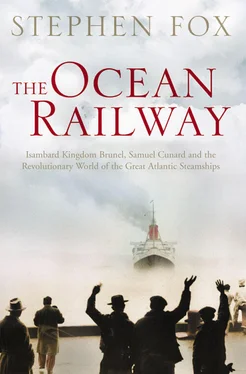The English author and protosociologist Harriet Martineauwrote the fullest, most forgiving account of a packet voyage. In August 1834, thirty-two years old, she had just completed a popular series of short stories that improbably urged the beauties of classical economics. For over two years she had written so constantly that she could not spare time even to take a walk. With that work finally done, basking in her first great success, she booked passage for New York on the Red Star Line’s United States,140 feet and 650 tons. Martineau looked forward to a restful month on the ocean without mail, newspapers, or intruding strangers, and then would travel around America to report on that boisterous, unmatured experiment in democracy.
She catalogued the twenty-three cabin passengers on board: a Prussian physician, a New England preacher, a Boston merchant ‘with his sprightly and showy young wife’, a high-spirited young South Carolinian returning from study in Germany, a newly married couple who kept to themselves, a Scottish army officer whose many crotchets amused the young people, an elderly widow, a Scottish lady of undisclosed age, and a young man from Yorkshire. The rest were English and American merchants, transatlantic veterans not deemed interesting enough by Martineau for detailed comment. With two or three exceptions, they all mingled congenially into a single travelling party.
The voyage began slowly, dawdling through calm days of little wind. The Americans, longing for home, became anxious. Martineau seized the welcome quiet time to think and be still. On the third day the wind freshened and the sea churned, leaving the dining saloon empty at dinner as most passengers remained seasick in their berths. The next morning, Martineau rose unsteadily but forced herself to dress and go up on deck to escape the bilious sights and activities below. Captain Nathan Holdredge took her to a seat by the rail. She looked out to sea, avoided noticing the invalids strewn around the deck, and felt better after half an hour. The wind was too strong for a large, flaring bonnet, but she tried a warm black silk cap, snugly fitted, which she recommended for any woman at sea.
An uncommon traveller, Martineau had two qualities that maintained her spirits on the ocean: a bottomless curiosity and delight in new experiences, and an absolute refusal to be discouraged by anything whatever. After six days of mostly unhelpful winds, the United States was still only three hundred miles from Liverpool; at that rate the voyage would take two months. No matter. ‘Our mode of life was very simple and quiet; to me, very delightful,’ she wrote. ‘A voyage is the most pleasant pastime I have ever known.’ After breakfast, the happiest meal of the day, she sat down to write a long article, the one major task she had set herself for the trip. The New England preacher would find her a place on deck, out of the wind and sun, and there she wrote through luncheon until two o’clock. Children from the steerage peered at the famous lady writer over her shoulder and from behind chests and casks. One particular man planted himself in front of her, arms akimbo, and stared at the point of her pen, transfixed by the mysterious act of female composition.
Finished writing for the day, she took her position at the rail and exulted in the passing scene. If she wanted to be left alone, she held a volume of Shakespeare. Otherwise someone joined her. ‘I strongly suspect,’ she later reflected, ‘that those who complain of the monotony of the ocean do not use their eyes as they do on land.’ She saw Portuguese men-of-war, flying fish, dolphins, and the web-footed birds called Mother Carey’s chickens. A sail on the horizon brought everyone over to look and exclaim. Early one morning a distant ship made signals of distress. Great flutters of excitement; ‘the faces of the gentlemen began to wear, in anticipation, an expression of manly compassion.’ Captain Holdredge took in sail and hove to. The other ship, it turned out, had only lost her longitude bearing. Holdredge shouted it out, angry over losing valuable time for such a small matter, and ordered the sails up again.
The captain, kind and patient even with repeated, unanswerable questions, could never forget his mandate for maximum speed at all times. One day Martineau noticed another ship ahead on the same westerly course. She told the captain, who took a hard look through his telescope and then barked out sharp orders to the helmsman and crew. The other ship was the Montreal of the rival Black X Line. Smaller and slower, she had left England four days before the United States. An ocean race was on. ‘Our captain left the dinner-table three times this first day of the race, and was excessively anxious throughout. It was very exciting to us all.’ In three days the United States overtook the Montreal and left her far behind, slowly falling below the eastern horizon.
Most days were clear enough for visible sunsets. Everyone, from cabin and steerage alike, gathered on deck. A few climbed up into the rigging. People grew quiet except for pointing out particular features in the clouds or sea. As the sun went under, some of the party stood on tiptoes, reaching for one last glimpse. Then the normal talk and bustle resumed as walkers promenaded the deck, thirty paces up and back.
After evening tea, Martineau avoided the convivial cabin and found a place to herself at the stern. A true writer, an onlooker by nature, she craved a safe solitude from which to watch developments. She studied the wake behind, ‘a long train of pale fire’, and the sails ahead, outlined against the sky and stars. A night fog might scud through, thick and moving fast, with occasional open spaces for the moon. Lost and engrossed, utterly content, sometimes she forgot that she was at sea. Snatches of old songs floated through her head from nowhere, and the first poems she had ever loved. ‘Such are the hours when all that one has ever known or thought that is beautiful comes back softly and mysteriously.’
She did acknowledge a few discomforts at sea: rainy days that kept everyone below in stifling air, and prolonged calms that made tempers short, provoking rude behaviour at dinner and accusations of cheating at shuffleboard. In mid-ocean, a ferocious storm lasted all night, to the disquieting sounds of breaking glass and screaming women. Towards the end of the long voyage, the dried fruits got mouldy, and the kitchen ran out of cider, ale, claret and soda water. In general, though, Martineau denied the usual purported annoyances of ocean travel. She made a list, in her methodical way, of all such claimed aggravations, along with their (to her) satisfactory remedies.
1 Seasickness. (‘An annoyance scarcely to be exaggerated while it lasts.’ No remedy.)
2 The damp, clammy feel of everything one touches. (Wear gloves, and clothes too worn to be spoiled. ‘In this latter device nearly the whole company were so accomplished that it was hard to say who excelled.’)
3 Lack of room. (Put everything away in tight, orderly fashion.)
4 The candles flare, dribble wax, and look untidy. (Avoid looking at candles; go to the stern at night, which has its own, better lights.)
5 The seats and beds are too hard. (Have patience. Try air cushions.)
6 Freshwater use is limited. (Bathe in seawater, and drink cider at dinner.)
7 The cider may run out. (Switch to other beverages.)
8 The noise of sailors scraping the deck. (Again, patience; because the deck must be scraped.)
9 The clamor overhead when the sails are shifted at night. (Go back to sleep.)
10 Sour bread. (Eat biscuits.)
11 Getting sunburned. (Don’t look in a mirror.)
Not even the North Atlantic Ocean could daunt such a temperament. (It should be noted that Martineau was partly deaf and therefore protected from the worst noises at sea.) After the restive final stretches of the passage, everyone’s spirits rose as the ship approached America. People changed into their best clothes, not seen for weeks, in preparation for landing. The United States reached New York after forty-two days: ‘a long but agreeable voyage,’ she insisted.
Читать дальше












